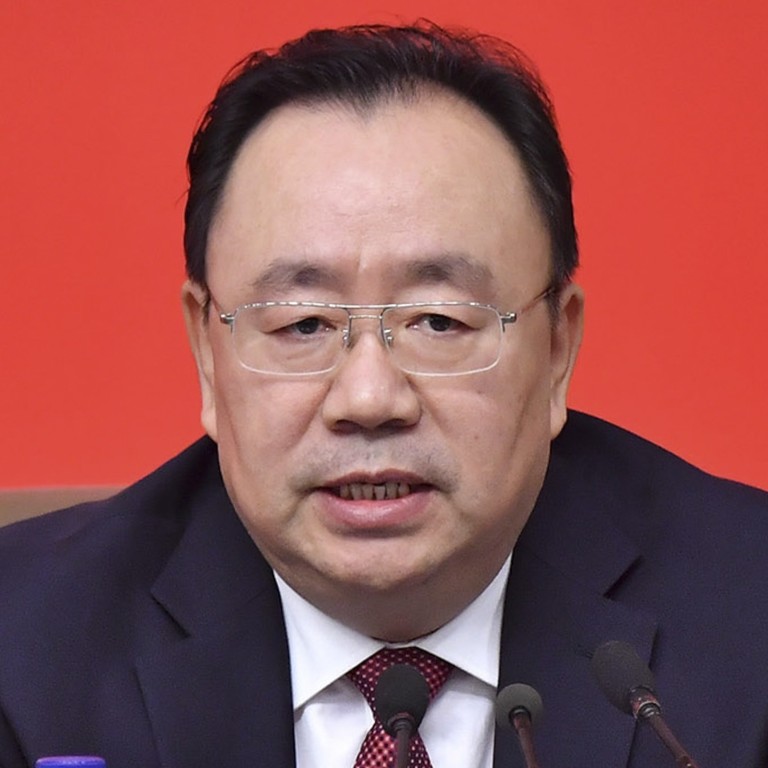
Diplomatic novice picked for top Communist Party job at China’s foreign ministry amid deteriorating relations with US
- Qi Yu is parachuted in from the party’s personnel wing as President Xi Jinping continues to shake up his foreign affairs team
- Appointment puts Qi just below Foreign Minister Wang Yi and top-ranking diplomat Yang Jiechi.
Beijing has taken the unprecedented move to elevate a veteran personnel cadre – and diplomatic novice – to be the foreign ministry’s Communist Party chief, amid growing international tensions and a sharp deterioration in relations between China and the United States.
The announcement on Tuesday night that Qi Yu, 58, former deputy head of the party’s all-powerful Organisation Department, would be the ministry’s party secretary took many Chinese diplomats and veteran China observers by surprise because of his lack of diplomatic experience.
Analysts said the appointment appeared to be part of ongoing restructuring of President Xi Jinping’s foreign policy team to further entrench party control of foreign affairs, particularly given Beijing’s strains with the US and other major powers.
Zhu Lijia, a professor at the Chinese Academy of Governance, said Qi’s promotion was in line with Xi’s focus on tightening party control, and showed the importance the Chinese leaders attached to foreign affairs.
“With the rise of China’s global standing, foreign relations have become increasingly important for the country, which is at a critical juncture of its reform and opening up,” Zhu said.
Under the new line-up, Qi will be in charge of the ministry’s personnel affairs while Foreign Minister and State Councillor Wang Yi, who served as the ministry’s party chief between 2007 and 2008, would still be responsible for implementing Xi’s foreign policies.
Both Wang and Qi will be under the leadership of the party’s newly elevated Central Foreign Affairs Commission, led by Xi, while top-ranking diplomat Yang Jiechi, a Politburo member and Wang’s predecessor, will be director of the commission’s office.
Within the foreign policy hierarchy, both Yang and Wang are considered more senior than Qi, since Yang is a Politburo member and Wang a state councillor and member of the party’s inner circle, the Central Committee.
China to restructure foreign affairs team in push for greater role on world stage, source says
“Qi’s appointment as party secretary means he’ll certainly play a more vigorous role in personnel-type of decisions and the allocation of resources within the ministry, while the minister can focus on the public roles shuttling around the world,” said University of Chicago professor Dali Yang.
“Given the vacancies and the difficulties [the ministry faces] in retaining staff, Qi may play a role in helping to bring about reforms in foreign service recruitment, compensation and benefits so the foreign affairs system can better attract and retain talent.
“Such appointments may help bring in additional resources.”
Zhu said Qi’s elevation was an unprecedented move because the ministry’s party chiefs were traditionally promoted from within. “It could be good news for the recruitment of younger generation of competent diplomats, because as party secretary, Qi would be in charge of personnel affairs within the ministry,” he said.
Qi replaces Zhang Yesui, 65, a former ambassador to the US and United Nations who served as the ministry’s party chief from 2013 and was appointed the spokesman of the top legislative body, the National People’s Congress.
Born in Xi’s ancestral province of Shaanxi, Qi has risen through the ranks over the years.
From the late 1990s, he spent over a decade as a researcher and then an editor of a publication under the Organisation Department that focused on party building. After serving as personnel chief in Qinghai and Jilin provinces for several years, Qi was promoted in 2015 to deputy head of the department under the watch of Chen Xi, Xi’s ally and the party’s top personnel official.
Pang Zhongying, a Beijing-based foreign policy expert, said Qi’s appointment appeared to be part of a shake-up of Xi’s foreign policy team that started about two years ago and included the promotion of Yang and Wang and the appointment of Wang Qishan as vice-president.
“We are at a sensitive and vitally important moment for China’s relations with the world. With the enormous challenges ahead, China will need a more competent and professional team of diplomats to oversee the country’s expanding global interests,” Pang said.
China to restructure foreign affairs team in push for greater role on world stage, source says
With top leaders adopting an increasingly hands-on approach on major foreign policy issues, the foreign ministry’s role in China’s diplomatic decision-making has gradually diminished in the past two decades. Top diplomats, who were generally not seen as part of Xi’s inner circle, appear to have struggled to gain access to the country’s highest ranks of power.
Zhang Lifan, a Beijing-based political observer, said the ministry was an executive body without much say in making decisions and bringing an outsider into the diplomatic team showed that its standing could decline even further.
“Party building is one of the seven major risks confronting China that were cited by Xi in his recent speech [on controlling risks] and it is likely that top leaders have attributed the deteriorating international environment to inadequate efforts [by the foreign ministry] on party building rather than errors in decision-making,” he said.
But Yang, from the University of Chicago, suggested the latest move might not necessarily mean the ministry was being sidelined.
Zhu also said that despite Qi’s lack of diplomatic experience, his appointment underscored that the overall qualities of senior officials, especially their ability to make right political decisions, may be considered a bigger factor in deciding high-level promotions.
Additional reporting by Jun Mai


